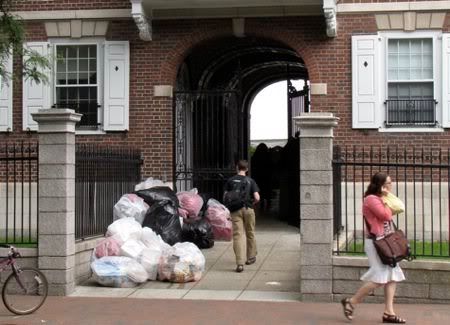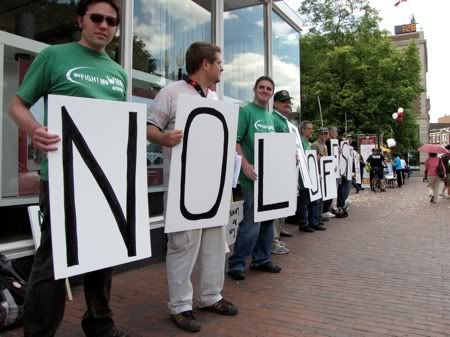Boston Labor Protests New Harvard University Layoffs as Students Walk

Cambridge, MA - As Harvard students walked in Thursday's commencement ceremonies, members and spokespersons of local unions, students and concerned community members rallied on the edge of the campus to protest the dozens of recent layoffs and Harvard University's newly announced plans to fire an additional four HUCTW employees from the School of Design. The action was part of the unions' and students' "No Layoffs Campaign," which aims to halt layoffs and reinstate those who have lost their jobs.
View more photos from Thursday's rally.
Among the approximately thirty people who turned out to protest Thursday were members of HUCTW, SEIU Local 615, AFSCME, and students from SLAM. Protesters stood in front of Holyoke Center, across from Harvard University campus, holding signs, chanting, "They say cut back, we say fight back!" and "They say layoffs, we say back off!" and distributing leaflets to passersby.
Geoff Caren, a Union Representative for HUCTW/AFSCME Local 3650 told Open Media Boston that Harvard plans to layoff four HUCTW members working at Harvard's School of Design. This comes after months of recent cuts and layoffs, which have broadly impacted workers, faculty and students:
- Over thirty members of SEIU Local 615, which organizes custodians and security officers, have been laid off in recent months
- Hundreds of dining hall workers in UNITE HERE have been forced to reapply for their jobs
- Overtime has been eliminated for UNITE HERE and HUCTW members, and other workers
- Faculty and non-union employees will not receive a raise this year
- Shuttle bus services have been cut
- Hot breakfasts have been cut in student dining halls
Caren said already there have been between thirty and fifty layoffs, but that it is difficult to know for certain because Harvard does not announce their layoffs. "Rank and file people like me, we just hear about them through word of mouth."
Daniel Brasil Becker, an organizer for SEIU Local 615, told Open Media Boston, "Where we have seen layoffs, it's been 30%-40% of the staff of janitorial workers in any given shift in any given work site. We do believe that this is an initial trial run. Nothing that Harvard said has indicated anything otherwise. And if 30%-40% is applied to the 800 janitorial workers that clean Harvard University, we're looking at hundreds of layoffs." Brasil Becker is concerned such layoffs would result in health hazards. Citing a recent outbreak of H1N1 virus at Harvard School of Dental Medicine, Brasil Becker noted the janitorial staff is tasked with providing a clean and healthy environment for the everyone on campus. He added, "For janitorial workers, they themselves suffer from numerous health hazards in the daily work that they do. When, as is the case with several of the workers who have already been impacted by layoffs, the workers who remain are asked to cover the job that three other workers were assigned to prior." Brasil Becker indicated this presents hazards not just for custodial staff, but potentially for others on campus if overstretched workers are unable to complete their duties.
Caren said that in addition to above-mentioned layoffs and cuts, Harvard uses "classic corporate intimidation" to delay its employees admittance into unions. Dennis Prater, a former Harvard employee who worked at the Radcliffe Quad Library, told Open Media Boston he worked as a temporary worker for more than a year before Harvard finally lay him off. According to Prater, after an initial three month period in the official capacity of a temporary worker, he was hired as a "light" worker—less than half time—then rehired through another temp agency.
Prater said he wanted to join the union as soon as he was able, but "at that point, I was out of money. I had been less than half time for a few months, out of money. I said, 'Ok, well I wanna be in the union, but I have to take this temp job.'" According to Prater, his supervisor earnestly wanted to find a union job for him but that as the recession deepened, he was told Harvard would need to let him go. "My impression was that there were some higher up things happening, where they didn't want to give the library for a union worker. Of course the administration didn't want to higher a union worker and have to pay more to give someone benefits and stuff. Look at what they're doing to the workers now. They use every excuse they can; the economic crisis, oh that's a big excuse to cut down on staff and make people work harder for the same pay."
When asked whether it was fair for union employees to face some repercussions of the recession along with Harvard faculty and students, Caren said, "No, I don't believe it's right for Harvard to make the lowest paid workers pay the price for their risky investments. They made the decisions in the early 2000s to shift their endowment from traditional endowment investments into a lot of extremely speculative endowment investments such as hedge funds, private equity, timber oiling tanks. And of course when the market was doing great, they did fantastic." According to The Harvard Guide, Harvard's endowment was valued at $25.9 billion in 2005. Caren estimated the university's endowment was approximately $36 billion at its height and "is still, by most estimates, at at least $28 billion now." Caren said those who live from paycheck to paycheck should not be the ones who lose out in this recession. "If there's any cuts, it should happen at the top. They pay their top money people millions of dollars per year."
Harvard Management Corporation's Board of Directors is chaired by James F. Rothenberg, a former President and Director of Capital Research and Management Co., and current member of the Harvard Corporation, which also includes in its membership ranks, Robert Rubin, who was forced out of his position as Chairman of Citigroup in January due to poor performance. When asked if any union members had a voice in HMC's investment decisions, Caren said he had no knowledge that was the case. "HMC does things their own way. They don't take advice from anybody." Caren agreed that while bankers and investors make the decisions for Harvard's endowment, it is the unrepresented workers who suffer their consequences.
Brasil Becker said, about HMC's investment strategies, "Universities do not run well under the business cycle. The model where one moment you have the money, the next moment you don't... This is the devastating impact on higher education of this model. We're suffering it today. [...] The Harvard endowment serves a purpose that is supposed to be directly tied to its mission. The purpose of [the] endowment is not to grow in and of itself. The endowment is not the mission of the University. They endowment must serve the mission of the University, and in times of economic duress, the endowment must be used to provide the services needed to keep functioning. Mass layoffs are antithetical to the mission of the University."
Harvard did not return Open Media Boston's request for comment.


No comments:
Post a Comment
Please be respectful of other people and their opinions in your comments.